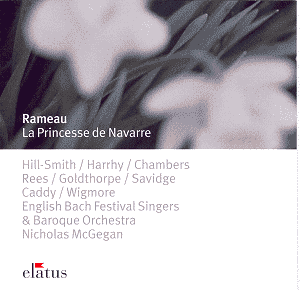Although nowadays Jean-Philippe
Rameau is considered the greatest French
baroque composer, he only came to real
fame when he was already fifty years
old. Then, in 1733, his first 'tragédie
en musique', Hippolyte et Aricie, was
performed in public. This was followed
later that decade by Castor et Pollux
(1737) and Dardanus (1739) and two 'opéra-ballets',
Les Indes galantes (1735) and Les Fêtes
d'Hébé (1739). By the
1740s his reputation was such that there
was no other composer who could be invited
to write the main music to be performed
during the festivities at the occasion
of the marriage of Dauphin Louis, son
of King Louis XV, to Marie-Thérèse
of Spain in February 1745. The festivities
in Versailles, which lasted a month,
started and ended with music by Rameau.
The events started with the 'comédie-ballet'
La Princesse de Navarre, which Voltaire,
who had written the text, described
as bringing together "the varied delights
of declaimed speech, dancing and music".
The whole thing lasted about three ands
a half hours, half of which consisted
of music, mostly for dancing. This disc
contains all the music Rameau contributed
to it.
Voltaire wasn't impressed
by the way the spoken dialogue was performed.
The theatre was so large that the actors
looked very small and the dialogue couldn't
be heard properly. But he was highly
satisfied by Rameau's music. The Mercure
de France wrote that Rameau "has perfectly
sustained the author's view of the text,
and the work's success has lived up
to the reputation of this celebrated
composer, justifiably renowned as the
foremost in his art, not only in France,
but in Europe as well".
The text is about Mars
and Love joining forces. The different
characters in the play, like the Warriors,
a Frenchman, two Spaniards, announce
their eagerness to follow their banners,
"in pleasure and in war". The chorus
sings: "Glory forever calls us, under
her banner we march, burning with ardour
most fervent for Louis, for Love and
Mars."
But more than his settings
of the text it is the instrumental music
which impresses. It takes almost two
thirds of the whole composition by Rameau.
It is his first work in which the overture
is written in the Italian style, with
three movements.
It is also the instrumental
music which gets the best performance
on this disc. Even though today's baroque
orchestras produce a richer sound and
realise Rameau's dances with greater
flexibility this recording is still
worth listening to.
The vocal items are
far less satisfying. Most singers are
not at home in this kind of music, or
even baroque music in general. They
use a far too wide vibrato and lack
the subtlety this music asks for. In
the duet 'Amour, dieu charmant' the
voices don't blend well. The singing
is often rather stiff and rigid. In
the air 'Non, le plus grand empire'
one hardly notices this is a menuet.
Since the booklet doesn't indicate which
singer takes which role it is impossible
to be more specific in regard to the
performances of the individual soloists.
Strangely enough there
is no more recent recording of Rameau's
music for La Princesse de Navarre. As
long as that is the case we should be
grateful that this recording is reissued
at budget price. But considering its
deficiencies, in particular in the singing
department, we have to hope someone
will make a more stylish and up-to-date
recording of this fine music in the
near future.
Johan van Veen


